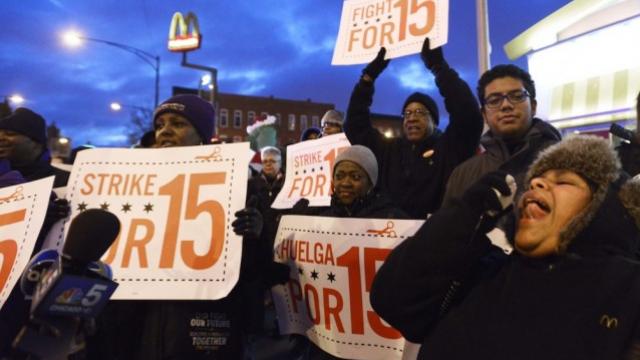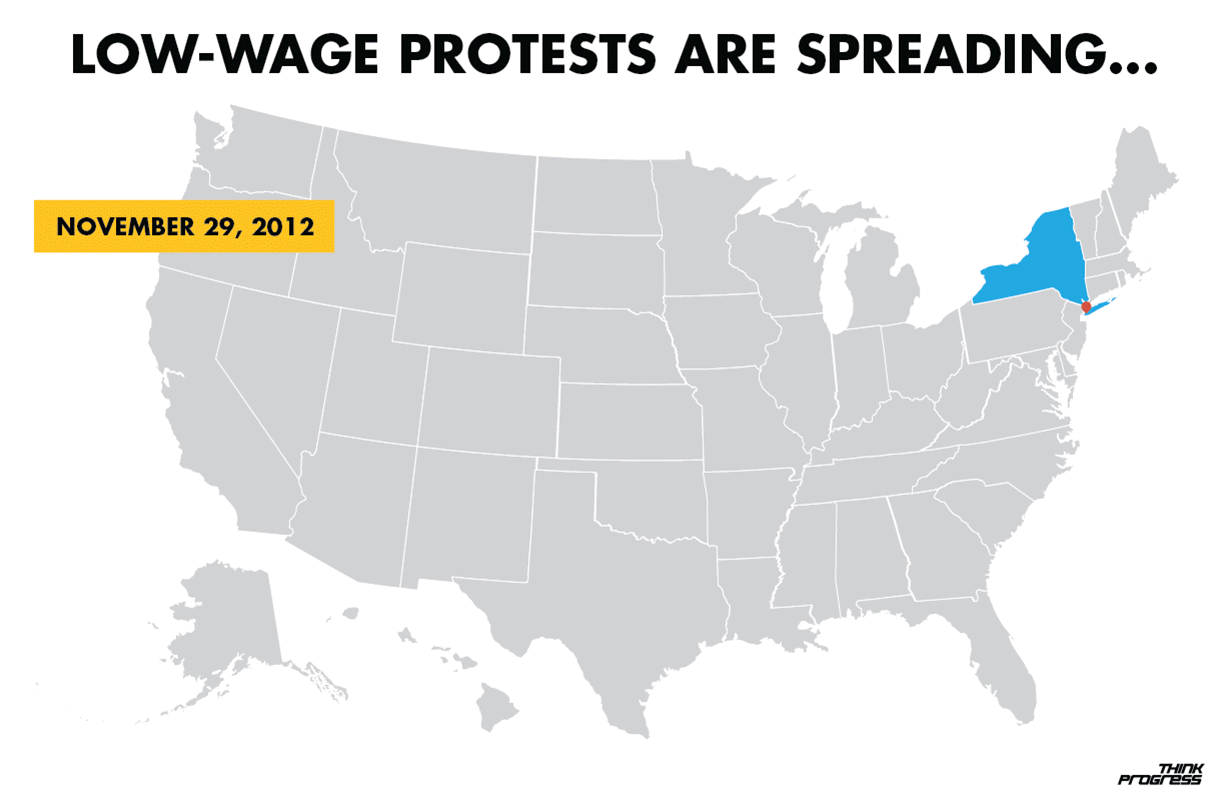
As fast food workers struck in 158 U.S. cities Thursday and solidarity protests sprang up in 30 other countries, it’s worth a look back at how their cause grew from a handful of people to a globe-spanning movement.
The fast food strikes began on November 29, 2012, with workers at a Manhattan McDonald’s. A few months later, a larger group of New York City fast food workers walked out. Then low-wage workers in Chicago got in on the act two weeks later. Last May, the strikes jumped to Detroit, St. Louis, Milwaukee, Washington D.C., and Seattle.
By late summer, that trickle had become a torrent, with strikes in about 60 cities in August that expanded the campaign to new regions of the country. Then in December, 2013, 100 cities saw fast food walk-outs and strikes by other low-wage workers.
August’s strikes were the biggest fast-food worker action on record until December’s happened. Now, about 18 months since the campaign began, workers broke their own record once again.
While Republican opposition to the minimum wage continues to stymie progress on the federal level, the fast food worker effort has shifted the political playing field and revealed cracks in both the business community’s resistance to raising worker pay and in the conservative political movement’s opposition to higher wage mandates.
Workers have even dragged President Obama along in their wake. The White House hasn’t joined workers in demanding $15 an hour, but it has raised its targeted minimum wage level from $9 an hour to $10.10 an hour over the course of the campaign.
All that momentum could eventually produce tangible progress for the millions of workers who currently work for poverty wages and are often not even paid properly for the hours they worked. The vast majority of them are grown-ups, many of them are parents, and almost all of them are paid so little that a full-time job isn’t enough to provide economic security.
The industry’s CEOs, by contrast, earn 1,200 times what their workers do. The fast food sector has the widest disparity between executive and worker pay of any American industry.
Workers went on strike in a total of 158 American cities Thursday, according to a press release from FastFoodGlobal.org, including in 56 U.S. cities where there had not been a strike during the most recent December wave of worker actions.
In addition, international worker solidarity actions are taking place in 93 international cities spread across 36 countries. Fast-food workers went on strike in the following U.S. cities:
Alameda, CA; Arvada, CO; Atlanta, GA; Auburn Hills, MI; Aurora, CO; Austin, TX; Ballwin, MO; Belleville, IL; Bellevue, PA; Berkeley, CA; Bloomfield, CT; Bloomington, IN; Boston, MA; Cahoka, IL; Cary, NC; Central Falls, RI; Charleston, SC; Charlotte, NC; Chesterfield, MO; Chicago, IL; Commerce City, CO; Concord, NC; Creve Coeur, MO; Dearborn, MI; Decatur, GA; Denver, CO; Dublin, CA; Durham, NC; East St. Louis, IL; Eastpointe, MI; El Cerrito, CA; Fairfield, CA; Farmington Hills, MI; Ferguson, MO; Ferndale, MI; Flint, MI; Flint Township, MI; Florissant, MO; Forsynth, MO; Fremont, CA; Glendale, CA; Glendale, WI; Greendale, WI; Greenfield, WI; Goldsboro, NC; Greensboro, NC; Greenville, NC; Grandview, MO; Gretna, LA; Haines City, FL; Hamden, CT; Hamtramck, MI; Hartford, CT; Harvey, LA; Hayward, CA; Henderson, NV; Henrico, VA; Highland Park, MI; Houston, TX; Huntington Park, CA; Indianapolis, IN; Inglewood, CA; Independence, MO; James Island, SC; Jennings, MO; Kannapolis, NC; Kansas City, KS; Kansas City, MO; Knightdale, NC; Lakewood, CO; Lansing, MI; Las Vegas, NV; Lenaxa, KS; Lincoln Park, MI; Livonia, MI; Los Angeles, CA; Madison, WI; Milwaukee, WI; Melvindale, MI; Memphis, TN; Metarie, LA; Miami, FL; Miami Beach, FL; Miami Gardens, FL; Morrisville, NC; Mt. Olive, NC; Nanuet, NY; Nashville, TN; New Haven, CT; New Orleans, LA; New York, NY; North Charleston, SC; North Las Vegas, NV; Oak Park, MI; Oakland, CA; Opelika, AL; Orlando, FL; Overland Park, KS; Pawtucket, RI; Peoria, IL; Philadelphia, PA; Pittsburgh, PA; Pleasant Hills, PA; Phoenix, AZ; Pleasanton, CA; Plymouth, NC; Pontiac, MI; Providence, RI; Pueblo, CO; Raleigh, NC; Raytown, MO; Redford, MI; Redford Township, MI; Richmond, CA; Richmond, VA; River Rouge, MI; Rockford, IL; Roeland Park, KS; Sacramento, CA; San Antonio, TX; San Diego, CA; San Leandro, CA; San Lorenzo, CA; Seattle, WA; Seekonk, MA; Slidel, LA; Southfield, MI; Southhaven, MS; Spencer, NC; Springfield, MO; St. Louis, MO; St. Petersburg, FL; Tampa, FL; Taylor, CA; Taylor, MI; Temple Terrace, FL; Union City, CA; University City, MO; Warren, MI; Warwick, RI; Waterford, MI; Wayne, MI; Wausau, WI; Wauwatosa, WI; West Allis, WI; West Milwaukee, WI; Westin, WI; West Memphis, AR; Westview, PA; Wilkinsburg, PA; Wheat Ridge, CO; West Haven, CT; Wethersfield, CT; Wilmington, DE; Windsor Locks, CT; Wentzville, MO; Wiliamston, NC; Winston-Salem, NC.
Fast-food workers protested in the following global cities/countries:
Akita, Japan; Aomori, Japan; Antigua; Auckland, New Zealand; Auxerre, France; Bandung, Indonesia; Bangkok, Thailand; Batangas, Philippines; Belfast, Ireland; Berlin, Germany; Bermuda; Bogota, Colombia; Bologna, Italy; Bordeaux, France; Brasilla, Brazil; Brussels, Belgium; Buenos Aires, Argentina; Busan, South Korea; Cardiff, United Kingdom; Casablanca, Morocco; Cebu, Philippines; Cesenatico, Italy; Colombo, Sri Lanka; Copenhagen, Denmark; Cork, Ireland; Curitiba, Brazil; Davao, Philippines; Djakarta, Indonesia; Dublin, Ireland; Florence, Italy; Fukuoka, Japan; Fukushima, Japan; Geneva, Switzerland; Gifu, Japan; Glasgow, United Kingdom; Goias, Brazil; Hachinoche, Japan; Helsinki, Finland; Hirosaki, Japan; Hong Kong; Kagoshima, Japan; Karachi, Pakistan; Kathmandu, Nepal; Kofu, Japan; Kyoto, Japan; Lahore, Pakistan; Leicester, United Kingdom; Lilongwe, Malawi; London, United Kingdom; Manaus, Brazil; Manila, Philippines; Matuyama, Japan; Milan, Italy; Mito, Japan; Morioka, Japan; Mumbai, India; Nagano, Japan; Nagasaki, Japan; Nagoya, Japan; Nara, Japan; Newcastle, United Kingdom; Oita, Japan; Okayama, Japan; Osaka, Japan; Oslo, Norway; Panama City, Panama; Paris, France; Porto Seguro, Brazil; Rawalpindi, Pakistan; Rome, Italy; Saga, Japan; San Juan, Puerto Rico; San Salvador, El Salvador; Santo Domingo, Dominican Republic; Sao Paulo, Brazil; Sapporo, Japan; Sendai, Japan; Seoul, South Korea; Sheffield, United Kingdom; Shizuoka, Japan; Stockholm, Sweden; Swansea, United Kingdom; Taipei, Taiwan; Takasaki, Japan; Tokushima, Japan; Tokyo, Japan; Trinidad; Valletta, Malta; Venice, Italy; Wigan, United Kingdom; Yamagata, Japan; Yogyakarta, Indonesia; Zurich, Switzerland.
Meanwhile, Shamus Cooke reports in Workers Action that San Francisco, like Seattle, is now riding the $15 wave:
It seems that Seattle has officially passed the $15 baton to San Francisco, and they’re running with it. On May 5th San Francisco had its first public organizing meeting to prepare for a ballot measure to raise the minimum wage to $15. The Labor movement and broader community organizations were well represented, and with them all the potential to achieve a great victory.
The San Francisco $15 proposal is stronger than the Seattle mayor’s version: the time line to get to $15 is shorter, and there are fewer exceptions.
San Francisco companies with more than 100 employees would have until 2016 to raise wages to $15 an hour, but they must lift wages to $13 an hour by next January. Businesses with fewer than 100 employees have until 2017 to raise wages to $15 an hour, but must raise them to $13 an hour by 2015 and $14 by 2016.
Polling has already indicated overwhelming support (59 percent) for the initiative.
The process that San Francisco is using also has other advantages over Seattle’s. The unions and community groups are working as a united front in San Francisco, whereas in Seattle there was constant tension between the socialist city council member Kshama Sawant and her $15 Now group of supporters versus the unions: Sawant wanted a strong version of $15 and several of the unions just wanted a deal, seemingly more interested in working with the mayor towards “consensus” between the unions and the corporations.
In San Francisco “consensus” was thankfully blown to pieces. The ballot initiative process goes over the head of the City Hall corporate politicians, destroying the consensus that San Francisco mayor was desperately seeking between the Chamber of Commerce — representing the giant corporations — and the unions. This has infuriated the 1%.
The San Francisco Chronicle reports: “The San Francisco Chamber of Commerce said it was ‘outraged by the preemptive minimum wage ballot measure’ designed by SEIU and its allies.” This is exactly the kind of outrage that should warm the heart of all working people.
The ballot initiative is also superior because it opens up the doors to wider participation of various community groups, who can mobilize their members to collect signatures, organize rallies, etc., instead of simply having four or five union reps cut a backroom, watered-down deal with the mayor and corporations.
Which begs the question: why don’t unions and community groups work together on inspiring ballot initiatives more often? Half the states in the country and many municipalities have the legal authority to evoke this brand of direct democracy, yet it’s rarely done.
The answer is, sadly, that this weapon is rarely used in an inspirational way because of the “partnership” between unions and the Democratic Party. The Democrats are adversaries of anything potentially harmful to the big corporations, which any economic measure that inspires working people will inevitably be.
This is why — as Obama’s presidency proved yet again — the Democratic Party is where hope goes to die.
Which makes the events in San Francisco all the more important: the $15 dollar initiative is an example of the unions making a big break, in practice, from the Democrats, which hopefully others around the nation will follow.
And follow they must, since it would be suicide for the national labor movement to sit idly as the fight for $15 snowballs. Union and community groups should be working together across the country for similar ballot initiatives wherever possible.
For those states without ballot initiatives, $15 can still be used as a rallying cry and a mobilizing force for change. Wherever the Democratic Party blocks this process, unions should come together and form a labor party.
Working People are Tired of Excuses
The fight for $15 also gives a boost to organizing new workers into unions as well. For example, Wal-Mart workers would love to make $15 an hour and the labor movement has been trying in vain to organize them for years. The slogan “$15 and a union” would resonate far better with Wal-Mart workers than anything the unions have yet put forth.
There are also many other unions that have already-organized workers who don’t make $15, and now they can have the confidence to demand $15 at the bargaining table, knowing full well that the broader community will come to their aid.
The $15 demand is especially important because it’s the first time in decades that the labor movement is going on the offensive. This is crucial. Three decades of playing defense — and playing it poorly — has had a demoralizing effect on the entire working class. A big offensive victory opens the doors wide to new possibilities and new horizons. It boosts confidence. One year ago $15 seemed like a fantasy; in five years we’ll hopefully be looking back at $15 with nostalgia, having achieved many other offensive victories.
The possibilities for unions and community groups to organize around $15 are endless. And if other unions don’t follow the example of the San Francisco unions and community groups, they’ll be acting as willing participants to the ongoing corporate onslaught. Not fighting back is no longer an option.
3 WAYS TO SHOW YOUR SUPPORT
- Log in to post comments
















